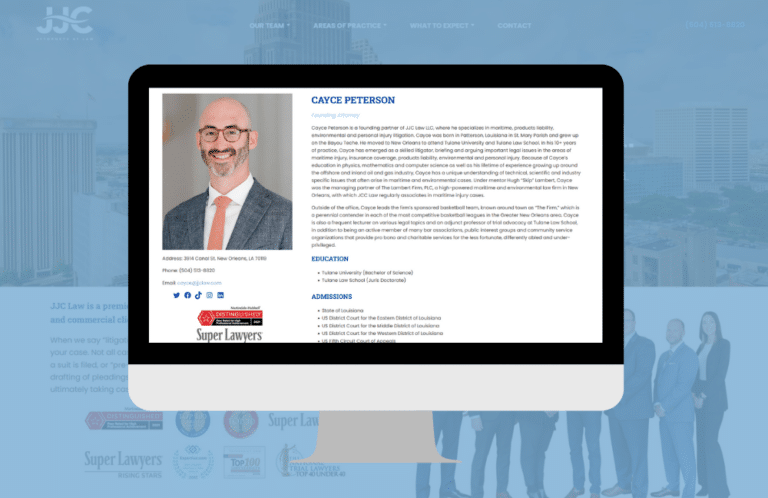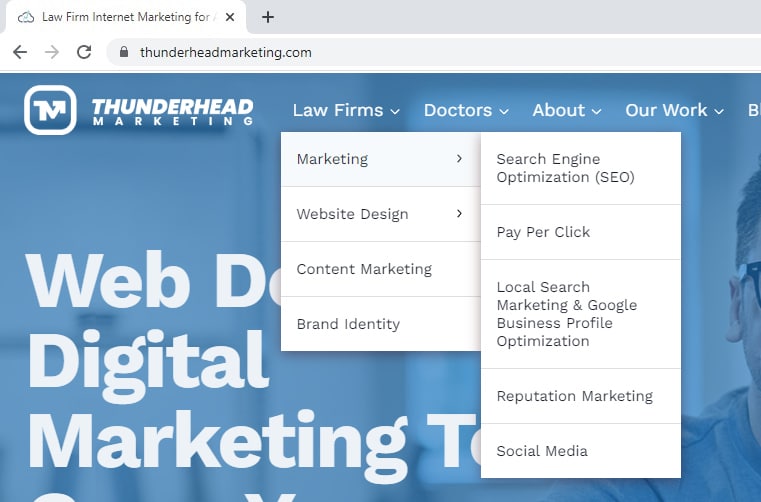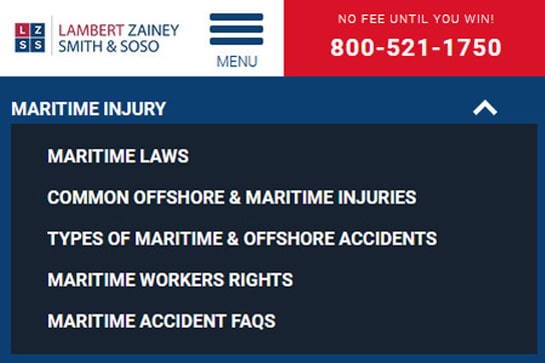The foundation of any successful law practice has always been trust. Today, this trust is cultivated not only in conference rooms and courtrooms but also online, where potential clients begin their search for legal guidance. For legal professionals, understanding and implementing strategies to enhance trust through their digital presence is not just beneficial for building client relationships — it’s essential for improving visibility in Google searches and standing out in a competitive marketplace.
What Are Google’s E-E-A-T Guidelines?
In the complex web of online information, the credibility and quality of content are paramount, especially in fields where decisions can significantly impact a person’s life or finances. Google’s E-E-A-T guidelines—Experience, Expertise, Authoritativeness, and Trustworthiness—provide a framework for evaluating content, with a specific focus on “Your Money or Your Life” (YMYL) pages. These include legal websites, where the stakes are high, and clients rely on accurate, trustworthy information to make informed decisions.
For attorneys and law firms, understanding and applying E-E-A-T principles is crucial in building a credible online presence and fostering trust with prospective clients. Let’s break these guidelines down further:
Experience
Experience refers to the practical knowledge or proficiency a content creator has in the topic they are discussing. For legal professionals, this means your legal website content should be created or reviewed by attorneys with direct experience in the specific area of law being discussed. Sharing real-life examples, case studies (when appropriate and anonymized), or personal insights from your legal practice can add a layer of authenticity and relatability that resonates with potential clients.
Expertise
Expertise focuses on formal qualifications, certifications, and educational background that validate your authority in the legal field. Highlighting the credentials, degrees, and bar memberships of your attorneys not only enhances your website’s credibility but also reassures visitors that the advice or insights come from highly qualified professionals. This is about demonstrating that your firm has the knowledge and capability to handle their legal needs effectively.
Authoritativeness
Authoritativeness is about recognition as a reputable source in the legal profession. Law firms can achieve this by showcasing notable accomplishments such as successful case outcomes, awards, media mentions, or publications in respected legal journals. Endorsements from peers or professional organizations can also bolster your authority. Consistently producing high-quality, relevant content over time is key to building and maintaining this reputation.
Trustworthiness
Trustworthiness is arguably the most critical element for legal websites. It centers on transparency, accuracy, and integrity in both your content and overall online presence. This includes being clear about your firm’s areas of practice, providing accurate legal information, and ensuring client confidentiality. Trust is further reinforced by avoiding overpromising outcomes and maintaining a professional, ethical tone in all communications.
The Importance of E-E-A-T for Legal Websites
In the legal profession, where clients’ lives, finances, and futures are often on the line, E-E-A-T guidelines are more than just SEO best practices — they’re a responsibility. Google prioritizes content with strong E-E-A-T signals for YMYL pages, which directly affects your website’s search engine rankings and visibility. For law firms, adhering to these principles is both a practical necessity and an ethical imperative.
Moreover, in a digital era rife with misinformation and untrustworthy legal advice, adhering to E-E-A-T principles sets your firm apart. It assures potential clients that the information on your website is reliable, safe, and actionable, fostering a digital environment where trust in your legal expertise can flourish.
Strategies for Demonstrating Trustworthiness on Your Legal Website
For legal professionals, building trust online reflects the integrity of your practice and ensures that potential clients feel confident and informed when considering your services. Here are key strategies to enhance the trustworthiness of your legal website, aligned with Google’s E-E-A-T guidelines:
Showcasing Credentials and Experience
- Highlight Qualifications: Prominently display the credentials, certifications, and professional achievements of your attorneys. Include detailed bios that outline their areas of practice, years of experience, and any specialized training.
- Professional Affiliations: Mention memberships in bar associations, legal organizations, and professional societies. These affiliations underscore your adherence to industry standards and reinforce your credibility.
Creating High-Quality, Client-Centric Content
- Informative and Accurate Information: Publish well-researched content that addresses common legal concerns, such as FAQs about specific legal processes, guides on understanding legal rights, or detailed explanations of your practice areas. Accuracy is key — legal content must be factually correct and up to date.
- Empowering Clients: Provide resources like checklists, templates, or explainers that help prospective clients understand their situation better. Empowering visitors with knowledge fosters trust and positions your firm as a helpful and approachable authority.
Securing Your Website
- HTTPS Protocol: Use HTTPS to safeguard client data and provide a secure browsing experience. This is fundamental for establishing trust with visitors.
- Privacy Policies and Data Protection: Clearly articulate how your firm protects client information. Be transparent about how data is collected and used, especially if you offer online consultations or intake forms.
Client Testimonials and Reviews
- Authentic Testimonials: Share genuine client testimonials (with consent) that highlight the positive outcomes and professional care they received from your firm. This adds a personal touch and demonstrates real-life trust in your practice.
- Manage Online Reviews: Monitor and respond to reviews on platforms like Google My Business or Avvo. Engaging with feedback, both positive and negative, shows you value client input and are committed to improving your services.
Regular Updates and Active Engagement
- Content Freshness: Keep your website updated with recent legal developments, firm news, or blog posts that address current legal trends. This not only demonstrates your active involvement in the legal field but also signals to visitors that your firm is up to date.
- Interactive Features: Implement features like live chat, contact forms, or Q&A sections to make it easy for prospective clients to reach out with their questions. Being accessible builds trust and makes your website more engaging.
Technical and Ethical Considerations
- Mobile Optimization: Ensure your website is mobile-friendly and easy to navigate. Many clients will search for legal services on their phones, so accessibility is critical.
- Ethical Advertising: Clearly label any sponsored content or promotions on your website. Avoid making exaggerated claims about outcomes or guarantees — clients value honesty and transparency in their legal representation.
By implementing these strategies, law firms can establish a trustworthy online presence that resonates with prospective clients. It’s about creating a digital environment where clients feel informed, valued, and confident in choosing your services. This trust is built over time, requiring consistent effort in producing high-quality, accurate, and client-centered content.
Expanding Trust Beyond Your Website
While a trustworthy website is foundational, establishing trust with clients online requires a holistic approach that extends across multiple platforms and touchpoints. Here are strategies for law firms to build and maintain trust beyond their website:
Social Media Presence
- Engage Regularly: Use social media platforms like LinkedIn, Facebook, or Twitter to share legal tips, industry insights, and updates about your firm. Regular engagement helps build a community and establishes a personal connection with potential clients.
- Responsive Interaction: Promptly respond to comments, messages, and questions. This demonstrates accessibility and a commitment to addressing client concerns in a timely manner.
- Educational Content: Post content that informs and empowers your audience, such as “know your rights” guides, explanations of common legal terms, or tips for navigating legal challenges. Providing value builds trust and positions your firm as a thought leader.
Online Reputation Management
- Monitor Your Online Presence: Keep track of mentions and reviews about your firm on platforms like Google My Business, Yelp, or Avvo. Use reputation management tools to stay informed and address feedback promptly. Get your free scorecard here!
- Address Negative Feedback: Respond to negative reviews professionally and constructively. Offer to resolve issues offline where appropriate, demonstrating a willingness to improve and meet client needs.
- Encourage Positive Reviews: Ask satisfied clients to share their experiences online. Positive reviews not only enhance your firm’s reputation but also provide reassurance to prospective clients evaluating your services.

Collaborations and Guest Posts
- Partner with Other Professionals: Collaborate with other attorneys, mediators, or legal influencers to create joint webinars, podcasts, or live Q&A sessions. These collaborations showcase your expertise and expand your reach.
- Contribute to Reputable Publications: Write articles for respected legal blogs, magazines, or journals. Guest posts allow you to showcase your knowledge to a wider audience and establish credibility within the legal community.
Community Involvement and Outreach
- Participate in Community Events: Host or attend legal clinics, local seminars, or community workshops. Engaging with your local community builds trust and enhances your visibility.
- Offer Expert Commentary: Provide insights for local media or contribute legal advice columns to local publications. Being visible as an expert in your field boosts your reputation and positions you as a trusted resource in your area.
Leverage Professional Networks
- Join Professional Associations: Be active in bar associations, legal organizations, and professional societies. This not only keeps you informed of industry developments but also enhances your credibility and opens networking opportunities.
- Networking Events: Participate in legal conferences or events where you can showcase your expertise and build professional connections. Speaking engagements or panel participation can significantly enhance your authority.
Building a Multi-Faceted Online Presence
Establishing trust beyond your website involves consistent and multi-faceted efforts. By engaging with clients and your broader community on various platforms, you reinforce your commitment to delivering reliable and client-centered legal services. This approach not only enhances your online reputation but also strengthens overall trust in your legal practice.
Measuring Success and Adjusting Strategies
Building trust and credibility online is an ongoing process, and it’s crucial to measure the effectiveness of your efforts to ensure your online presence is meeting the needs of potential clients. By tracking key metrics and refining your approach, you can optimize your strategy for greater impact. Here’s how law firms can measure success and fine-tune their trust-building efforts:
Key Metrics to Monitor
- Website Traffic: Use tools like Google Analytics to track overall traffic, page views, and the sources of your visitors. An increase in traffic to key pages, such as attorney bios, practice area descriptions, or contact forms, signals growing interest and trust.
- Engagement Rates: On social media and your website, track likes, shares, comments, and time spent on pages. High engagement rates suggest that your content resonates with your audience and fosters a sense of community.
- Conversion Rates: For law firm websites, conversions might include inquiries through contact forms, appointment bookings, or newsletter sign-ups. Improvements in these areas suggest that visitors trust your firm enough to take the next step.
- Bounce Rate: A high bounce rate (visitors leaving your site quickly) may indicate that your content isn’t meeting expectations or that your site’s user experience needs improvement. A low bounce rate reflects better engagement and relevance.
- Client Reviews and Feedback: Track reviews on platforms like Google, Yelp, or Avvo, and consider the tone and content of the feedback. Positive reviews and detailed testimonials highlight successful trust-building efforts.

Adjusting Your Strategies
- Content Relevance and Quality: If your engagement is low, revisit your content strategy. Are your blog topics addressing client concerns? Are your legal guides easy to understand? Adjusting your content to align with client needs can boost engagement.
- Website User Experience (UX): High bounce rates could indicate UX issues. Ensure your site is easy to navigate, mobile-friendly, and fast-loading. Small improvements can make a big difference in keeping visitors engaged.
- Social Media Approach: If social media engagement is lacking, experiment with different types of posts, posting times, and interactive content like polls or live Q&As. Tailoring your approach to your audience’s preferences can increase interaction.
- Review Management: Respond promptly to negative feedback and identify recurring issues. If multiple reviews mention the same problem, consider adjusting internal processes to address client concerns.
Soliciting Client Feedback
- Surveys and Questionnaires: Periodically solicit feedback from clients through surveys to gain insights into how your online presence influences their trust and satisfaction.
- Client Advisory Boards: Establish a panel of former or existing clients to provide regular input on how your firm’s services and online strategies can be improved.
Continuous Improvement
The digital landscape and client expectations are constantly evolving. Regularly reviewing your metrics and adjusting your strategies ensures that your firm stays relevant and maintains a strong, trustworthy presence online. Consider scheduling regular reviews of your performance, celebrating successes, and identifying areas for growth.
Ready to Elevate Your Online Presence? Take the Next Step Today
In the journey toward building a trustworthy and engaging online presence, the path is ongoing and ever-evolving. Whether you’re starting from scratch or looking to enhance your current strategies, the importance of aligning with Google’s E-E-A-T guidelines and extending your trust-building efforts beyond your website cannot be overstated. But you don’t have to navigate this path alone.
Thunderhead Marketing is here to guide you every step of the way. Our expertise in digital marketing for law firms can help you craft an online presence that not only meets but exceeds the expectations of your clients. From optimizing your website for trust and credibility to expanding your influence across the web, we’re ready to help you make a meaningful impact.
Don’t let the potential of your online presence go untapped. Contact Thunderhead Marketing for a personalized consultation. Let’s work together to build an online presence that reflects the high quality of legal representation you provide. Reach out now to start your journey towards a more trusted and engaging digital footprint.







